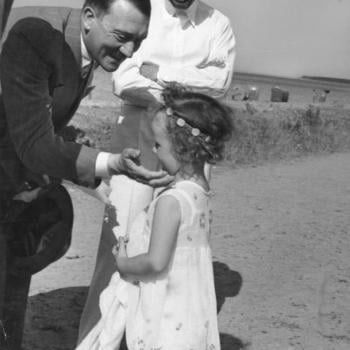Embarrassed by the Parousia? Evangelicals and the Return of Christ
A while back I blogged here about evangelical embarrassment about the supernatural, miracles. I admitted then that most American evangelical Christians pay lip service to the reality of miracles but seem reluctant actually to believe in contemporary miracles—except “on the mission fields” (viz., Africa and Asia). This is a major change from when I was growing up in the “thick” of American evangelicalism. I suspect two things changed American evangelicalism’s attitude toward miracles and the supernatural: 1) wanting respectability in secular culture, and 2) fear of and embarrassment about “miracle ministries” that tended to see miracles everywhere.
Let’s face it. American evangelicalism has largely accommodated to American culture. Whichever way the winds of culture blow evangelicals are quietly swept along. Oh, of course, we know about “those evangelicals” that tout social and political conservatism, but to me that’s an illustration of my point. American society in general has leaned heavily to the right on social and political issues, with a few exceptions, and many, if not most, evangelicals have leaned with it. The kind of prophetic liberal activism on behalf of the weakest members of society that heavily marked much of nineteenth century evangelicalism (read Donald Dayton’s Rediscovering an Evangelical Heritage, 2nd edtion [Baker Books]) virtually disappeared along with the rise of Social Darwinism in American social thought.
Now my attention turns to an even more obvious shift in American evangelicalism. When I was growing up in the “thick” of the American evangelical movement one of its hallmarks was confident expectation of and looking forward to the imminent return of Jesus Christ. Our hymn books, recorded and broadcast music and preaching, sermons, prayers and devotional literature were filled with the themes of eschatology—the end of the world as we know it by the “second coming of Christ.”
Aside from the occasional outbreaks of “eschatology fever” among fundamentalists evidenced by popular books forecasting a year when Jesus will return, American evangelicals as a whole have all but dropped eschatology as a subject of songs, sermons and conversation. Why?
One reason is that we, American evangelicals, are “at ease in Zion”—an old evangelical phrase for Christian complacency due to prosperity. For the most part we live our lives the same as others except on Sunday morning.
Another reason is that we, American evangelicals, over emphasized eschatology during the 1960s and into the 1970s, decades that corresponded with threats to Israel and fear of nuclear wars, so that afterwards we dropped it. I think the “fall of the iron curtain” in the late 1980s was a major cause of our neglecting eschatology.
Evangelicals near my own age well remember The Late, Great Planet Earth and “Like a Thief in the Night” and “I Wish We’d All Been Ready.” That book (and the genre it inspired), that movie (and the genre it inspired) and that song (and the fear it inspired) so saturated evangelical consciousness that, when the parousia (return of Christ) didn’t happen, we turned inward with our spirituality and focused our outward attention on politics.
But the parousia is such a strong theme of the New Testament (and very strongly hinted at in the Old Testament) that we are little better than Thomas Jefferson who literally excised with scissors everything in the New Testament that he thought irrational. We ignore the apocalyptic portions of the Bible and skip over its emphasis on the return of the Messiah Jesus to judge the world and reign over it as lord.
I’m not calling for a renewal of eschatological fever, paranoia, “life boat ethics,” or any of that that so unfortunately often accompanied evangelical emphasis on the parousia in earlier times. I’m calling for a renewal of balanced, sane emphasis on the parousia as a genuine theme of the New Testament and hallmark of evangelical faith—confident expectation of God’s future visible victory over evil and vindication of his Son’s lordship. I’m calling for us to pray with the primitive churches of the New Testament “Maranatha!” (“Come, Lord Jesus!”)
No, I don’t want the pendulum to swing back to the eschatological fever of the 1960s and 1970s. I’m not the least interested in projects of “date setting” of the year of the Lord’s return. I will not put a bumper sticker on my car saying “In case of rapture this car will be driverless.” Nor will I review books here that engage in “left behind” theology—a kind of fundamentalist paranoia about the “Great Tribulation.” I’m not a dispensationalist—“progressive” or otherwise. But I do believe we, “mainline,” non-fundamentalist evangelicals have, by and large, abandoned a huge portion of the Bible and our own heritage by ignoring eschatology almost entirely. I understand the reasons for it. I, too, am dismayed by those fundamentalist Christians who focus too much attention on the “rapture,” the “Great Tribulation,” and the “Antichrist.” They give biblical, Christian eschatology a bad name. And they are why most mainstream evangelicals have simply given up on the parousia and eschatology. But that’s a mistake. The cure for abuse of a topic is not disuse but proper use.
Notice to potential commenters: Don’t bother commenting dismissively from a non-Christian perspective; this is a subject of Christian theology and assumes belief in the authority of the Bible. If the Bible is not your guide to life, I doubt you have anything helpful to say about this subject. Please don’t clutter up my comment “box” with derision based on a non-biblical, non-Christian worldview. Also, please don’t bother telling me/us about fundamentalist churches that still emphasize eschatology; I am talking about centrist, “mainline” evangelicalism (e.g., churches related to the National Association of Evangelicals and that look to Christianity Today as a publication that speaks for them).
















